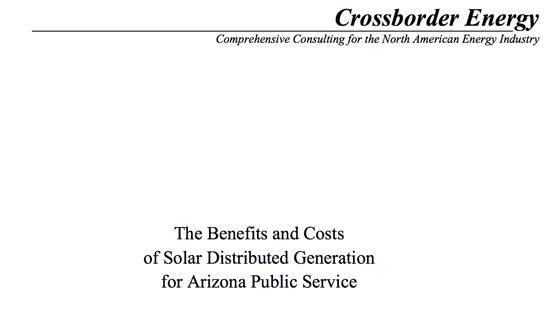The Alliance for Solar Choice (TASC) submitted a letter today to the Arizona Corporation Commission that discusses the subsidy provided to Arizona Public Service and its customers by ratepayers who invest their private capital in solar installations.
Customers with rooftop solar systems are not fairly compensated for the many benefits these systems provide to the grid, including avoided costs for conventional power generation and new power plants, reduced investments in transmission and distribution infrastructure, and avoided costs associated with meeting renewable energy requirements.
A Crossborder Energy study presented during APS’ technical conference in May shows that rooftop solar will provide over $34 million per year in uncompensated benefits to all of APS’ customers. The letter submitted by TASC calls on the Commission, which regulates APS, to address this cross subsidy currently embedded in the rate structure.
To rectify this inequity, TASC believes that a “system-benefit credit” should be allocated to each solar customer in addition to the retail rate credits that net-metering customer-generators receive.
“A capacity-based or energy-based credit fits within APS’s existing tariff framework for residential and commercial customers,” TASC said in its letter. “Regardless of which type of credit is used, the Commission and APS can integrate the credit into current rate structures without novel concepts or methodologies.”
Based on comments from just several years ago, APS would presumably support the move. This 2009 report was commissioned by APS and praises DE. An excerpt follows:
“The winning business case for solar DE in Arizona is a combination of hard, quantitative economic facts, such as the reduction of line losses, energy savings for customers, and reduced or deferred capital expenditures. But it also includes softer, qualitative benefits such as increased job opportunities for installers, a more sustainable environment, and as yet unquantifiable benefits that will likely become economic in the future, such as the value of carbon. The broader economic benefits would include improved worker productivity and a more robust solar DE manufacturing industry. To capture the benefits of a winning business case it will be important to regularly monitor and report on the progress being made, and to look for opportunities to remove barriers to the successful expansion of solar in the state. It is the removal of those barriers and the movement toward the tipping point – where solar is the norm – that will prove the programs have become mainstream and part of a new energy future. The state of Arizona has a particularly important role to play in the future of solar energy.”
Net metering is the latest target by the monopoly utility APS to curtail competition and preserve profits in its territory. APS wants the Arizona Corporation Commission to change the rules so the utility can take homeowners’ excess solar energy without providing customers full value for the power, all the while maintaining its monopoly status. It is doing so because its own annual reports warn that the future proliferation of independent rooftop solar is a serious threat to future profits.
Polls show that voters think solar power companies will save taxpayers money, are better for the environment than utilities, and they believe that any elected official who votes to end the solar program will be committing political malpractice.
For a copy of TASC’s letter to the Arizona Corporation Commission, email Mike Scerbo at MScerbo@RoseMoserAllynPr.com
TASC advocates for maintaining successful distributed solar energy policies, such as retail net metering, throughout the United States. Retail net metering (NEM) provides fair credit to residents, businesses, churches, schools, and other public agencies when their solar systems export excess energy to the grid. The organization was formed on the belief that anyone should have the option to switch from utility power to distributed solar power, and realize the financial benefits therein. The rooftop solar market has been largely driven by Americans’ desire to assert control over their electric bills, a trend that should be encouraged.












